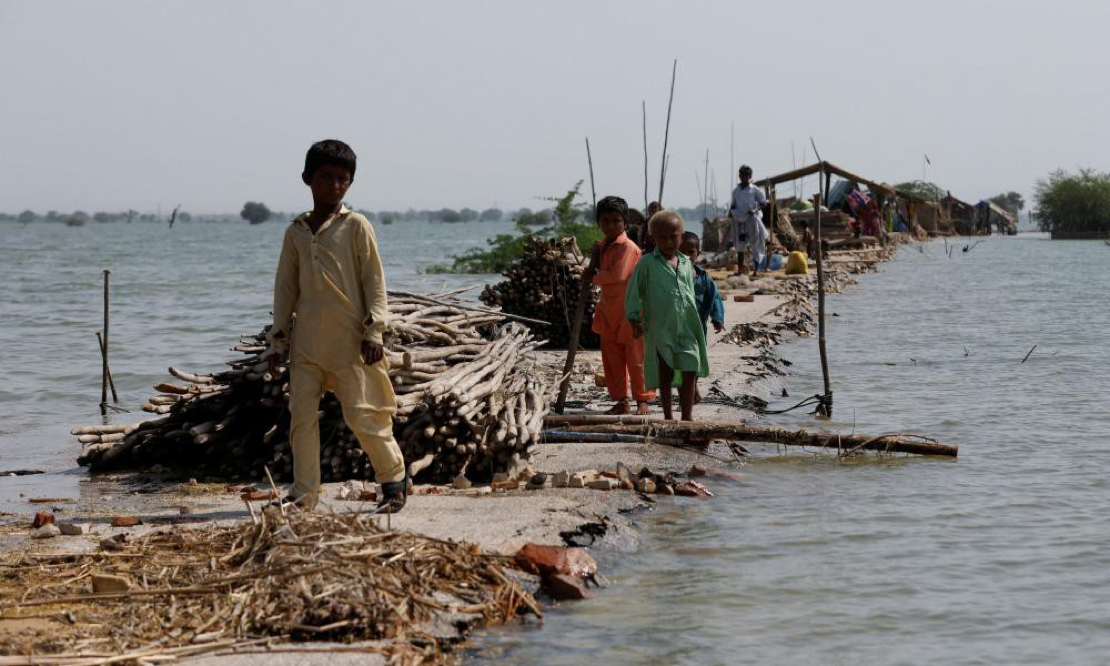Heavy rain compounds decades-long environmental catastrophe at country’s largest freshwater lake
Maula Bakhsh Mala’s village was submerged by Lake Manchar for the third time last week. “What bad luck we have,” said the 68-year-old fisher. “When there is no water in the lake, we are starving. When there is plenty of water, we are drowning.”
Late last month, after weeks of heavy rain and flooding, Pakistan declared a state of emergency. The UN secretary general, António Guterres, has described the rain as a “monsoon on steroids”. Earlier this month, satellite images showed one-third of the country has experienced severe flooding.
The record monsoon rain and melting glaciers have brought floods affecting 33 million people and killing at least 1,314, including 458 children, said Pakistan’s National Disaster Management Authority.
And for the people living around Lake Manchar, the largest freshwater lake in Pakistan, the monsoon has compounded an environmental catastrophe that has been breaking up their community for a decade.
After years of living with a lake that has been slowly disappearing while also appearing to silt up with pollution, the lake flooded and then burst its banks last week, submerging the surrounding villages and leaving local residents stranded.
As Maula Bakhsh, fighting for the rights of fishers and for the lake, put it: “We are drowning due to administrative negligence.”
For years, there has been growing concern about the lake. Research into the pollution by Dr Asghar Ali Mahesar of Mehran University of Engineering and Technology showed industrial and municipal wastewater from upper Sindh and Balochistan, as well as agricultural wastewater, has been flowing into the lake, creating dangers for local fishers and marine life. Villagers were no longer able to use the lake for drinking water.
Paryal Mallah, 60, has fished in the lake for decades. “There was a time when wherever we throw a fishing net in the lake, the net came out full of fish, but now we don’t get enough fish to cover two meals a day,” he said.
Due to the scarcity of fish in the lake, the income of local fishers has been reduced to such an extent that they have no choice but to migrate, Mallah said.
Malli, 55, who lives on a boathouse, is having to leave with her family due to the lake’s toxic water. “We have been living in hard times, we are compelled to leave our ancestral boathouses for livelihood,” she said.
More than 200,000 people used to live on the lake, according to Pakistan’s 1988 census, but that number has since dwindled to about 3,000.
Residents initially welcomed the rain, hoping it might revive the lake, although they were aware that in the long term, only a government restoration project would bring about an improvement.
Aijaz Mallah, 35, said: “Fresh water from hill torrents in the lake will become a source of livelihood only for three to four months. We want [the] government to take honest measures to restore this lake.”
The lake was once a haven for marine life, home to almost 32 species of fish including carp, catfish, tilapia, spiny eel and snakehead. Now, according to Maula Bakhsh, as few as six species are left.
Fareeduddin Mustafa, the deputy commissioner of Jamshoro, a district around the lake, said the majority of local residents have left the area, while the rest have been advised to leave.
Mustafa said they were being provided with shelter in government buildings, but locals say residents remain stranded, with many people homeless. They say rescuers are not reaching everyone.
Authorities insist the water pressure is reducing and that the situation will be brought under control.




